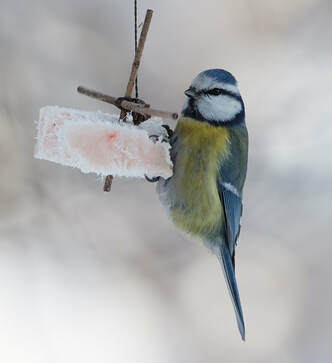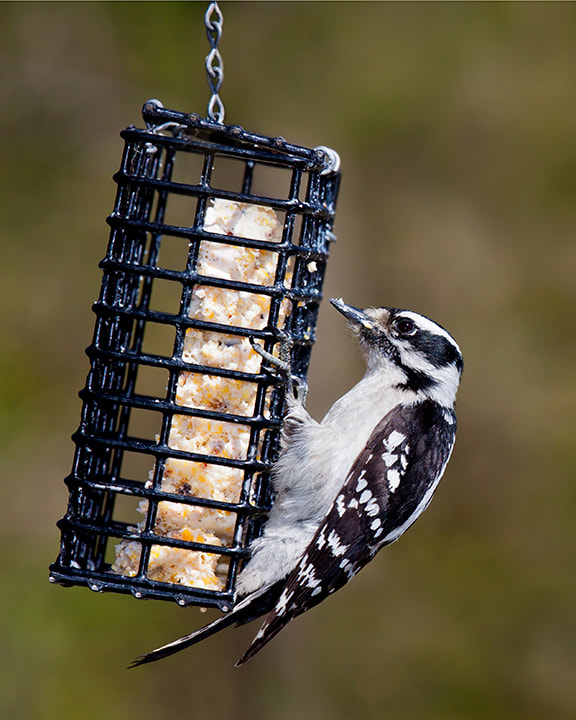It takes soap for us rescuers to get fats and oils out of a birds feathers - they simply cannot do this themselves, neither their bills nor their saliva is able to do this. Birds groom their heads with their feet, so even if their belly feathers do not wind up soiled, they can easily spread these fats to their feathers by grooming with feet that have fat on them. Myself and several other songbird rehabilitators are quite concerned about this growing trend and get fat contaminated birds in which we must bath to save. Don't trust me? Smear your hands with any oil or fat you are feeding your bird, now go try to wash it off using only water. I use Dawn soap to get suet and fats out.  Belly feathers and feet touching fat= deadly for birds. Greasy birds are dead birds, as lack of waterproofing, allows water to contact their skin, which then makes them cold, cold birds spend more time preeing then eating, once very cold thats all they will do and slowly starve to death. Cold wet birds starve or die from hypothermia. Key to fats are their melting points and fats like suet with high melting points are safest. Note the following melting points are for ambient air temp, not direct sun - note any time fats are exposed to sun that temp can get high even in cold weather. Direct sun starts to melt any of these on contact which means always feed fats in the shade. Here are some facts. Takeaway 3 is that the only safe fat is suet. (and some kinds of peanut butter if fed correctly. Suet: a particular kind of beef fat found around organs and groin. Raw it is hard, crumbly, with far less water and no blood veins as is found in general beef fat. Its melting point is about 110 degrees. It is used raw in recipes (mainly British). Beef fat; must be rendered (melted down and sterilized) to be made hard enough to form and to kill bacteria. Melting point is 95 degrees. This should not be used for feeding birds. First, though its melting point is 95, surface melt is more likely to occur, making any home suet greasy. Rendered beef fat is not "suet" - you can get it hard, but still its low melt point makes it risky for birds' feathering and waterproofing. (Regions with zero degree weather, 24 hours a day, this can work, like Fairbanks). Vegetable oils: Coconut and palm are the only plant fats that are hard at room temperature. Their melting points are 75-77 degrees. This is way too low for a "suet" type of bird food. Also, birds likely do not have the digestive enzymes to digest these oils. In contrast, you will see even songbirds pick at dead animals, which is likely why eating our suets was not so hard to get them to do. Animal proteins and fats are closer to the types of foods they eat, at least the insectivores. Peanut butter - melting point is high, 104. Just make sure that it has NO ADDED OILS - no other vegetable oils and no sugars. The best kind is fresh ground kind - where you pour the peanuts into a machine and you get fresh peanut butter, no salts, no oils, no sugar. Added to suet, this makes a "no melt" sort of suet. Recipe for Favorite suet: No Melt peanut butter & suet. Ground oatmeal, corn flour or finely ground, quick oats with its flour, rendered suet. Add peanut butter if you want a no melt. You can add seeds, nuts, and fruit. Please ALWAYS USE A SUET FEEDER...either a cage or something that encloses the fats. You can use logs if they are hung so that the bird cannot get the fat on them (vertical is usually required for this AND if they have a landing perch. NEVER EVER EVER SPREAD FATS OR OILS ON TREE LIMBS!!!! I cannot express how dangerous this is for birds. And you will NOT notice their demise, unless you are banding and keeping watch for months. What I am saying here is common sense, not that hard to reflect on why this is bad. Audubon and others sites have fine print that comment about the impact of fats on feathers. Native Bird Care and other Songbird rehabilitators are currently pressuring Audubon and other organizations to stop promoting this fat fad and the impacts its having. Note that even on a cage, a bird can get its feathers exposed to fats. The cleaner your cage feeder, the safer for the bird. The colder it is, the likely the suet will crumble off the feet, rather than melting.
Comments are closed.
|
AboutNative Bird Care's is celebrating its 10th anniversary! Our main focus is song, shore, and waterbirds. We offer specialized care and facilities for these extraordinary birds.. Archives
July 2024
Categories
|


 RSS Feed
RSS Feed